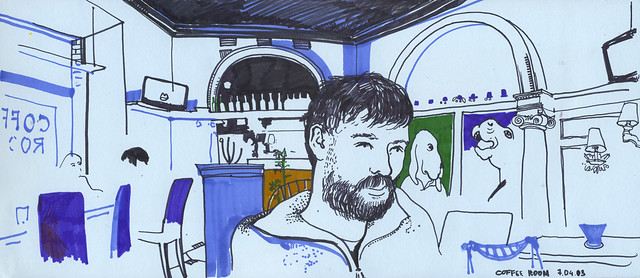Extreme Boating
What would it be like to navigate a rowboat through a lake of mercury? What about bromine? Liquid gallium? Liquid tungsten? Liquid nitrogen? Liquid helium?
-Nicholas Aron
Let's take these one at a time.
Bromine and mercury are the only known pure elements that are liquid at room temperature.
Rowing a boat on a sea of mercury just might be possible.
Mercury is so dense that steel ball bearings float on the surface. Your boat would be so buoyant that you'd barely make a dent in the mercury, and you'd have to lean your weight into the paddle to get the end of it below the surface.

In the end, it certainly wouldn't be easy, and you wouldn't be able to move fast. But you could probably row a little bit.
You should probably avoid splash fights.
Bromine is about as dense as water, so a standard rowboat could in theory float on it.
However, Bromine is awful. For one thing, it smells terrible; the name "bromine" comes from the ancient Greek "brōmos", meaning "stench". If that weren't enough, it violently reacts with a lot of materials. Hopefully, you're not in an aluminium rowboat.

If that's not incentive enough to avoid it, the Materials Safety Data Sheet on bromine includes the following phrases:
- "severe burns and ulceration"
- "perforation of the digestive tract"
- "permanent corneal opacification"
- "vertigo, anxiety, depression, muscle incoordination, and emotional instability"
- "diarrhea, possibly with blood"
You should not get in a splash fight on a bromine lake.
Liquid gallium is weird stuff. Gallium melts just above room temperature, like butter, so you can't hold it in your hand for too long.
It's fairly dense, though not anywhere near as dense as mercury, and would be easier to row a boat on.
However, once again, you'd better hope the boat isn't made of aluminium, because aluminium (like many metals) absorbs gallium like a sponge absorbs water. The gallium spreads throughout the aluminium, dramatically changing its chemical properties. The modified aluminium is so weak it can be pulled apart like wet paper. This is something gallium has in common with mercury—both will destroy aluminium.
Like my grandma used to say, don't sail an aluminium boat on a gallium lake. (My grandma was a little strange.)
Liquid tungsten is really hard to work with.
Tungsten has the highest melting point of any element. This means there's a lot we don't know about its properties. The reason for this—and this may sound a little stupid—is that it's hard to study, because we can't find a container to hold it in. For almost any container, the material in the container will melt before the tungsten does. There are a few compounds, like tantalum hafnium carbide, with slightly higher melting points, but no one has been able to make a liquid tungsten container with them.
To give you an idea of how hot liquid tungsten is, I could tell you the exact temperature that it melts at (3422°C). But a better point might be this:
Liquid tungsten is so hot, if you dropped it into a lava flow, the lava would freeze the tungsten.
Needless to say, if you set a boat on a sea of liquid tungsten, both you and the boat would rapidly combust and be incinerated.
Liquid nitrogen is very cold.
Liquid helium is colder, but they're both closer to absolute zero than to the coldest temperatures in Antarctica, so to someone floating on them in a boat, the temperature difference is not that significant.
A Dartmouth engineering page on liquid nitrogen safety includes the following phrases:
- "violent reactions with organic materials"
- "it will explode"
- "displace oxygen in the room"
- "severe clothing fire"
- "suffocation without warning"
Liquid nitrogen has a density similar to that of water, so a rowboat would float on it, but if you were in it, you wouldn't survive for long.
If the air above the nitrogen was room temperature when you started, it would cool rapidly, and you and the boat would be smothered in a thick fog as the water condensed out of the air. (This is the same effect that causes steam when you pour out liquid nitrogen.) The condensation would freeze, quickly covering your boat in a layer of frost.
The warm air would cause the nitrogen on the surface to evaporate. This would displace the oxygen over the lake, causing you to asphyxiate.
If the air (or the nitrogen) were both cold enough to avoid immediate evaporation, you would instead develop hypothermia and die of exposure.
Liquid helium would be worse.
For one thing, it's only about one-eighth as dense as water, so your boat would have to be eight times larger to support a given weight.

But helium has a trick. When cooled to within two degrees of absolute zero, below about two degrees kelvin, it becomes a superfluid, which has the odd property that it crawls up and over the walls of containers by capillary forces.
It advances up the walls crawls along at about 20 centimeters per second, so it would take the liquid helium less than 30 seconds to start collecting in the bottom of your boat.
This would, as in the liquid nitrogen scenario, cause rapid death from hypothermia.
If it's any consolation, as you lay dying, you would be able to observe an odd phenomenon.
Superfluid helium films, like the one rapidly covering you, carry the same types of ordinary sound waves that most materials do. But they also exhibit an additional type of wave, a slow-moving ripple that propagates gates propogates along thin films of helium. It's only observed in superfluids, and has the mysterious and poetic name "third sound."
Your eardrums may no longer function, and wouldn't be able to detect this type of vibration anyway, but as you froze to death in the floor of a giant boat, your ears would be filled—literally—with a sound no human can ever hear: The third sound.
And that, at least, is pretty cool.








